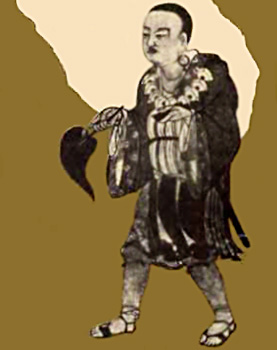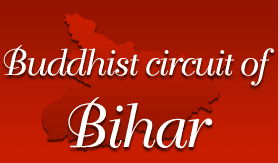|

Nalanda to Champa
Going east we enter a great forest wild, and after 200 li or so we come to the country of I-lan-na-po-fa-to
(Hiranyaparvata).
Hiranya-patvata, the great country
This country is about 3000 li in circuit. The capital of the country is 20 li or so round, and is bounded on the north by the river Ganges. It is regularly cultivated, and is rich in its produce. Flowers and fruits also are abundant. The climate is agreeable in its temperature. The manners of the people are simple and honest. There are ten sangharamas, with about 4000 priests. Most of them study the Little Vehicle of the Sammatiya (Ching- liang-pu) school.
Twelve Hindu temples
There are some twelve Deva temples, occupied by various sectaries.
Two convents attached to Sarvastivadin
Lately the king of a border country deposed the ruler of this country, and holds in his power the capital. He is benevolent to the priests, and has built in the city two sangharamas, each holding something less than 1000 priests. Both of them are attached to the Sarvastivadin School of the Little Vehicle.
A Hindu temple
By the side of the capital and bordering on the Ganges river is the Hiranya (I-lan-na) mountain, from which is belched forth masses of smoke and vapour which obscure the light of the sun and moon. From old time till now Rishis and saints have come here in succession to repose their spirits. Now there is a Deva temple here, in which they still follow their rules handed down to them. In old days Tathagata also dwelt here, and for the sake of the Devas preached at large the excellent law.
A stupa
To the south of the capital is a stupa. Here Tathagata preached for three months. By the side of it are traces
of the three Buddhas of the past age, who sat and walked here.
Srutavimshatikoti’s birth-place, worship of Surya-deva
To the west of this last-named spot, at no great distance, is a stupa. This denotes the spot where the Bhikshu Srutavimshatikoti (Shi-lu-to-p'in-she-ti-ku-chi) was born.
Formerly there was in this town a rich house-holder (grihapati], honoured and powerful. Late in life he had an heir born to his estate. Then he gave as a reward to the person who told him the news 200 lakhs of gold pieces. Hence the name given to his son was Sutravimshatikoti (Wen-urh-pih-yih). From the time of his birth till he grew up his feet never touched the ground.
For this reason there grew on the bottom of his feet hairs a foot long, shining and soft, and of a yellow gold colour. He loved this child tenderly, and procured for him objects of the rarest beauty. From his house to the Snowy Mountains he had established a succession of rest-houses from which his servants continually went from one to the other. Whatever valuable medicines were wanted, they communicated the same to each other in order, and so procured them without loss of time, and so rich was this family. The world-honoured one, knowing the root of piety in this man was about to develop, ordered Mudgalaputra to go there and to instruct him. Having arrived outside the gate, he had no way to introduce himself (to pass through). Now the householder's family (or simply the householder) worshipped Surya-deva. Every morning when the sun rose he turned towards it in adoration. At this time Mudgalaputra, by his spiritual power, caused himself to appear in the disc of the sun and to come down thence and stand in the interior. The householder's son took him to be Surya-deva, and so offered him perfumed food (rice) and worshipped him. The scent of the rice, so exquisite was it, reached even to Rajagriha. At this time Bimbisara-raja, astonished at the wonderful perfume, sent messengers to ask from door to door whence it came. At length he found that it came from the Venuvana-vihara, where Mudgalaputra had just arrived from the abode of the (rich) householder. The king finding out that the son of the householder had such miraculous (food), sent for him to come to court. The householder, receiving the order, considered with himself what was the easiest mode of transport; a galley (boat with bancs of oars) is liable to accidents from wind and waves; a chariot is liable to accident from the frightened elephants running away. On this he constructed from his own house to Rajagriha a canal basin, and filled it full of mustard seed. Then placing gently on it a lordly boat furnished with ropes with which to draw it along, he went thus to Rajagriha.
First going to pay his respects to the Lord of the World, he (i.e., Buddha) addressed him and said,
"Bimbasara-raja has sent for you, no doubt desiring to see the hair beneath your feet. When the king desires to see it, you must sit cross legged with your feet turned up. If you stretch out your feet towards the king, the laws of the country exact death."
The householder's son, having received the instruction of Buddha, went. He was then led into the palace and
presented (to the king). The king desiring to see the hair, he sat cross-legged with his feet turned up. The king, approving of his politeness, formed a great liking for him. Having paid his final respects, he then returned to the place where Buddha was.
Tathagata at that time was preaching the law and teaching by parables. Hearing the discourse and being moved by it, his mind was opened, and he forthwith became a disciple. Then he applied himself with all his power to severe thought, with a view to obtain the fruit (of Arhatship). He walked incessantly up and down, until his feet were blood-stained.
The Lord of the World addressed him, saying,
"You, dear youth, when living as a layman, did you know how to play the lute?"
He said, "I knew."
"Well, then," said Buddha, "I will draw a comparison derived from this. The cords being too tight, then the sounds were not in cadence; when they were too loose, then the sounds had neither harmony nor charm; but when not tight and not slack, then the sounds were harmonious. So in the preparation for a religious life, the case is the same; too severe, then the body is wearied and the mind listless; remiss, then the feelings are pampered and the will weakened."
Having received this instruction from Buddha, he moved round him in a respectful way, and by these means he shortly obtained the fruit of Arhatship.
A small solitary mountain, with a double peak, Buddha rested during rain.
On the western frontier of the country, to the south of the river Ganges, we come to a small solitary mountain, with a double peak rising high. Formerly Buddha in this place rested during the three months of rain, and subdued the Yaksha Vakula (Yo-c'ha Po-khu-lo).
A great stone with Buddha’s impression and a stupa
Below a corner of the south-east side of the mountain is a great stone. On this are marks caused by Buddha sitting thereon. The marks are about an inch deep, five feet two inches long, and two feet one inch wide. Above them is built a stupa.
Another impression on the stone
Again to the south is the impression on a stone where Buddha set down his kiun-chi-kia (kundika or water- vessel). In depth the lines are about an inch, and are like a flower with eight buds (or petals).
The foot-traces of the Yaksha Vakula
Not far to the south-east of this spot are the foot-traces of the Yaksha Vakula. They are about one foot five or six inches long seven or eight inches wide, and in depth less than two inches. Behind these traces of the Yaksha is a stone figure of Buddha in sitting pasture, about six or seven feet high.
A place where Buddha walked
Next, to the west, not for off, is a place where Buddha walked for exercise.
The old residence of the Yaksha
Above this mountain top is the old residence of the Yaksha.
A foot-trace of Buddha
Next, to the north is a foot-trace of Buddha, a foot and eight inches long, and perhaps six inches wide, and half an inch deep. Above it is a stupa erected. Formerly when Buddha subdued the Yaksha, be commanded him not to kill men nor eat their flesh. Having respectfully received the law of Buddha, he was born in heaven.
Seven hot springs
To the west of this are six or seven hot springs. The water is exceedingly hot.
To the south the country is bounded by great mountain forest in which are many wild elephants of great size.
Leaving this kingdom, going down the river Ganges, on its south bank eastwards, after 300 li or so we come to the country of Chen-po (Champa.).
|
